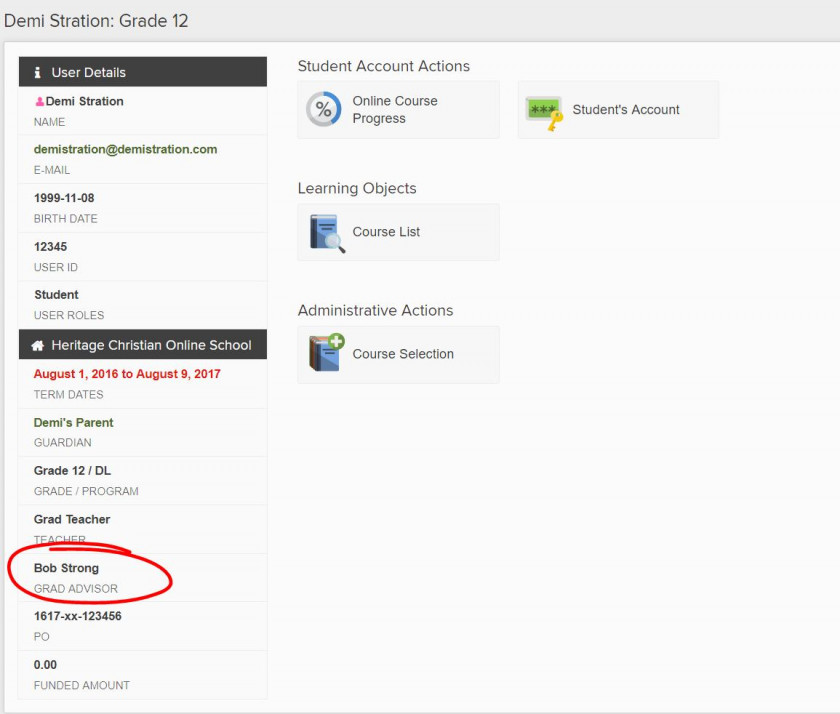Transitioning from Grade 9
Welcome to the Grad Program!
This page is to help you understand some of the ins and outs and changes as you move from Grade 9 to Grade 10. At any time, if the information is confusing please feel free to reach out to your Grad Advisor (GA). They are your sidekick through your grad years!
Student Support
There are lots of resources and people to support your student's learning journey:
- The Office - office@onlineschool.ca
- Your Grad Advisor - check Encom under your Home information:
Your Grad Advisor is the one to answer any questions you have about the grad program, requirements, course selection - the list goes on! - Your Student's Teachers - each course, online or individualized, has a course specialist teacher at the grad program level. Please feel welcome to reach out at anytime to have discussions, or check in to see where you student is at.
- Director of Grad Program - Chelsea Bitgood, chelsea.bitgood@onlineschool.ca
- Special Education (SE) Department - Learning Services (LS) and Special Education teachers. If this is something you feel your student could benefit from, please bring it up in discussion with your Grad Advisor who can connect you to the right person on the team!
Prerequisite Courses
Although the ministry does not mandate prerequisite courses - having taken a specific course before being able to take another - it is highly recommended that in core subject areas you have completed the prior grade level.
Core Courses: Mathematics, Sciences, English Language Arts and Social Studies
For example, to take Foundations and PreCalculus Math 10, it is expected that a student has successfully demonstrated completion of a Math 9 course.
Course Types
The grad program currently has three different types of course offerings, all with subject specialist teachers:
- Individualized Courses
These courses are designed using a Student Learning Plan template (SLP). The parent/student works together with the teacher to build and structure their learning goals, resources and materials. The modernized curriculum provides many opportunities for these courses to be unique, and tailored to a learner's passions and interests. Some individualized courses are hosted in Moodle where students can log in to submit assignments and work samples to their teachers as well as accessing additional resources for learning. These courses require parent participation to help facilitate the learning. - Online Courses
These courses are hosted in Moodle, and all the of the learning activities and resources are provided for the students to complete. Curriculum is designed by the HCOS team, with biblical integration, in order to provide a robust learning experience for every student. Parent involvement is encouraged, though not required. - Hybrid Courses
Hybrid courses are a mix between the two options. These courses use Moodle as a platform to structure the learning journey and are a teacher directed course. In some courses, students will choose their resource, and then based on their resource choice are given instructions on how to complete it. In others, teachers post material for students to follow along with in a more synchronized fashion.
All courses follow the modernized curriculum and the content outcomes, curricular competencies, core competencies and big ideas.
Please feel free to check out the ministry curriculum here.
Hopefully during your Grade 9 year you were able to try an online course. We recommend that during middle school years, students try to take 1 or 2 online courses. When the content starts to get heavier as the grades progress, often families are not sure how to support some of the core subjects - this is where an online course is a fantastic option to continue your academic journey.
While in middle school, students should participate in the planning of their SLP's. If they can attempt to help make suggestions and understand what is expected with their support teacher, the transition to those discussions with the grad program teachers will be smoother.
Grad Assessments
The provincial government has mandated that all students must write two required exams before graduating, the Numeracy Assessment and the Literacy Assessment.
The Numeracy Assessment 10 can be written anytime after completing Grade 9 Math, and can be written up to three different times before graduation. Students should take their first attempt in their grade 10 year.
The Literacy Assessment 10 and 12 are to be written in the corresponding grade years. Students have up to three attempts on each to improve their scores.
For more tips and tricks about getting ready for the Grad Program, please click here.

